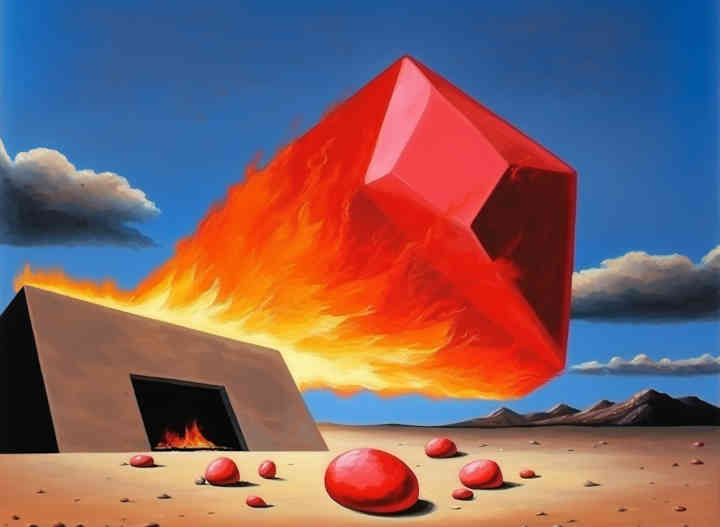The Burning Bush
Building Instruments of Insight

Most of my best thinking occurs as I walk. The first mile serves to clear my head. At this phase the voices swirl and tumble over one another, while the rhythm of the march settles the dust and the pertinent questions rise, precipitate and find voice. I never force it, I allow it. I sweep the ground of this "soul" like a front porch in perpetual autumn. By the time my legs are tired, my lips are usually moving. Walking is my secret weapon. It's what makes my prose seem so ambling, laissez-faire, and yet unaccountably dogged: tenacious in its twists, with its ability to turn a ragged edge into a pulled thread. What's disorienting to the average reader, is the number of concurrent threads entwining my digits, the way I seem to allow the discourse to become a tangled ball only to give it a tug and reveal that there was no knot. It's a high thread count we ply. Who knew tenderness could be obtained from density? As though by accounting for every stray thought in the midst of articulation we impart the sense that sudden interpretative crystallizations are safe in this place, because in the midst of all that diversity, foreclosing finality is not possible. Sometimes I feel like I'm running an orphanage for human experience. - As a child I had the idea to become a garbage man: the way they hung off the back of that truck with one hand looked like my meat and potatoes. But it goes deeper: I feel an advocacy for everything denied, repressed, verworfen. Growing up in an agricultural heartland, there was an enormous sugarbeet processing plant near my childhood home, the odor of which everyone claimed to abhor. But as a small boy I made the counterclaim that it was not merely a "bad" smell but interesting - because they weren't experiencing it, merely repeating one another. Something else comes to mind: amidst all the fascinating rust involved in 20th century industrialized farming, there was a very curious property I would pass on my way to school every day which captured my imagination. Most observers dismissed it as just another junkyard full of worthless rotting relics, a common sight in the rural West. But it sparked in me a vision of freedom that's never left me, because in that yard there was not only a tractor, an old truck, but a gleaming aluminum airplane, which to me revealed the possibility of endless creativity, invention, repurposing. To be a Da Vinci of the discarded: that dream has persisted and is reflected in my lifestyle as a stubbornly offgrid redneck, and what must seem like an equally inexplicable advocacy of the repressed and forbidden content of our various worlds. I don't usually talk about the concrete details of my current life, firstly because they are a precious refuge, and secondly because they invariably induce a volatile cocktail of envy, disbelief, and dismay. "Why would someone capable of our kind of success choose to neglect it, unless there was something wrong with him? If I'm not permitted escape, nor shall anyone." First issuance of ape law: what cannot be possessed must be destroyed. Therefore I don't attempt to share the laughlines of my face, the austerity of my desert home, nor its peace. Nor would it do any good to explain that I have of course escaped very little. That my choices add up to a cumulative confrontation: with myself, with my flaws, with my past, and with this continually cresting history with as much clarity as I can stand. What I do attempt to share, is the little handheld obsidian mirror I carry, the scrying stone which has the ability to reflect the neglected aspects of your experience - everything lying in wait, lying in rubble, perched on loose scree, and behind locked doors, velvet ropes and buried under heaps of garbage. I come bearing gifts - maybe still a little encrusted with filth and stink - but if I hand you another polished product, what good will it do you? You're surrounded by spit and polish, swimming in the spittle of slick ploys, and just because the chute you're sliding down ass-first has walls, you imagine it must end up somewhere safe. But if I leave a little of the work to you, to clean and set those gems or leave them in the rough, gazing on their potential, then they have a chance of becoming yours, not merely another dead artifact but a living power object. I want to teach my readers to build their own instrument of insight: something that stirs the suffering fragments, provokes them into a whirlwind, so that the vortex may speak. The "burning bush" is what we used to say - now we talk about the "unconscious coherence of repressed ideation", but the sense of liminal apoplexy remains.


